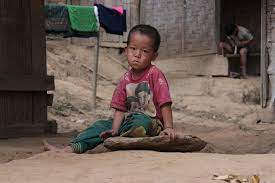Poor children pay high price of malnutrition

That many of the world’s humanitarian organisations have sounded an alarm over malnutrition and hunger crises in the world is no longer an abstract concept for Kenyans.
The coronavirus pandemic has shattered many systems, including income sources and flow of food, something Nicler Chehezo knows too well.
Before the Covid-19 landed in the country, she was able to make ends meet. Her work as a laundry woman was enough to put food on the table for herself and her son, David, aged four.
It was also enough to make sure she is able to pay school fees for him, which included a balanced diet meal every day.
But now, she is unable to get any job, as her clients are afraid of transmitting or contracting the virus.
“I used to afford good meals and even fruits before corona (sic). But ever since I stopped working and schools closed, we have been eating two meals a day,” Nicler says.
The stark contrast between the pre-Covid-19 meals of ugali and sukuma wiki, meat, beans and rice and seasonal fruits and the Covid-19 meal of strungi (black tea) for breakfast and lunch and ugali and seasonal vegetables for dinner is already having an impact on David, who has an intellectual disability that makes him take longer than usual to learn basic things. At four, he is yet to string a full sentence.
“I do not remember when we last had a fruit, and the meat we see and smell is the one hanging on butcheries,” she says.
She adds that David does not like eating cabbages, so sometimes in a day, he only takes strungi and ugali for breakfast and dinner, with strungi alone for lunch.
She is glad that in Kabiria, Nairobi, where she lives, there is plenty of vegetables, which makes consumption of ugali everyday a bit easier.
“His weight is already dropping. In January and February, I had a hard time lifting him up because he was heavier.
Right now, he is lighter. I can lift him up easily,” says the concerned mother of two. Her other child, a class eight candidate, is upcountry with his grandmother.
Nicler, like many low-income earning Kenyans, is now left with a difficult situation: she has to plan how to use her money, if any, and make a decision between buying food and paying rent.
Emmanuel Kasaine, the headteacher of Goodrich Primary School, where David learns, says the school feeding programme was god-sent to the parents.
The informal school with about 200 students used to provide porridge at 10am and a balanced meal for lunch.
However, now with school closed, lack of food provision for students has hit parents hard.
“I have received calls from many parents asking whether there is food in the school for their children.
I know quite a number of children that have gone hungry because of their parents’ inability to get food,” he says.
Breastfeeding children
Things are the same, if not worse for Janet Akinyi, 20. The young mother of a 10-month old baby boy has to grapple with providing food for her weaning baby.
Before Covid-19, she used to do laundry and general cleaning for customers in Lang’ata and Kilimani.
The money she earned was enough to feed her and buy diapers for son, who was still breastfeeding.
“Sometimes I would get work, but the client would delay payment, this meant I slept without eating,” Akinyi says.
She hates borrowing money, therefore, she does not ask any friends or neigbours in Kibera for money.
Now that her child is weaning and prospects of jobs are nowhere in the horizon, Akinyi is in dire straits.
The support she receives from Young Changemakers Group created by Superb CBO, a community organisation working with girls and women in Kibera is not enough.
According to Botul Omar, the group’s coordinator, the 15 girls under her care are currently struggling to get food for themselves and their babies, most below one year.
“The interruption of the pandemic means some of these children don’t get their meals on time.
Sometimes, lactating mothers sleep hungry, and you can imagine what that does to the children’s health,” she says.
Sarah Awino’s son, Lloyd aged three, has cerebral palsy. He does not understand why there is no food at home.
“With my elder children aged 11 and eight, I can explain why they will not eat. For Lloyd, it is not that easy,” Sarah says. This is compounded by the closure of the Action Foundation Hub in Kibera, where Lloyd gets therapy.
“The therapy, done twice weekly, used to help him a lot. They used to massage him and help with sitting and standing. However, with months gone by without therapy, Lloyd has become weaker,” she adds.
Prisca Akumu from the hub says they used to provide porridge to the children under the programme. Most parents brought their children for both therapy and some nutritious food. This supply has since been cut.
“We used to give them porridge when they came for sessions, but now we can’t. Things are now quite difficult for parents who cannot afford a meal,” she says. Training on how parents can feed their children, especially those with nutritional challenges, has also been affected. Many parents have complained their children’s health and weight have been affected.
Status of malnutrition
United Nations International Children’s Fund (Unicef) report, the State of the World’s Children 2019: Children, food and nutrition, highlights that over 200 million are either undernourished or overweight.
Undernourishment refers to the inability to get enough food to meet dietary energy requirements.
It further indicated that children aged two to three years old do not get enough food to support their rapidly growing bodies, thus making them susceptible to disease, poor brain development, low immunity and sometimes death.
Kenya was, according to the UN agency, on course in 2019 to achieve its nutrition targets.
The Kenya Demographic and Health Survey (KDHS) 2014 places the country’s prevalence of under-five stunting at 26.2 per cent, a reduction from 35 per cent from KDHS 2009, but higher than the developing country average of 25 per cent.
It also reduced child wasting from seven per to four per cent; underweight from 16 per cent to 11 per cent and overweight from five per cent to four per cent in the same period.
The impact of Covid-19 on economies and source of income and eventually food consumed is set to reverse this progress.
Nyanumba Kepha, a consulting nutritionist, says nutrition is important in the development and growth of children, and that health status of children is usually determined based on how they are fed in the first 1,000 days of life.
“Depending on how the weaning process is done, children get affected. We have seen breastfeeding mothers not coming for comprehensive feeding programmes for weaning, and yet this is where most nutritional issues start in children, especially in their nutrient and energy needs,” he says.
In some cases, parents do not know how to introduce foods. Some include sugar, salt and cooking oil before one year, leading to micronutrient deficiency.
When a mother fails to eat, the children do not get the right quantity and quality of food, says the expert.
Weight is one of the key ways to note the effect of lack of nutrients in their children.
“When malnutrition affects children, they will not add weight as required. With time, they become underweight, compromising their immune system, which means they become prone to infections,” says Kepha.
He adds that in the long-term, the school performance of the children gets affected.
“Brain development takes place during the early stages of life, and when they lack nutrients such as omega 3 and iron, this development is compromised and as such, they will not perform well in school,” he adds.
Christine Nderitu, a nutritionist, adds that poor nutrition leads to poor growth, which then results in stunting.
Besides poor performance in schools, children will have an increased risk of obesity and chronic diseases such as diabetes and hypertension. They will end up with poor learning later in life.
“We are currently experiencing a double burden of malnutrition where we have undernutrition (wasting, stunting and micronutrient deficiencies) along with overweight and obesity, coexisting with diet related non-communicable diseases” she says.
As such, these condition increase health costs thus demanding more resources to provide quality care.
Watching the devastating effects of the pandemic, many organisations have come forth to not only help by donating food, but also to provide long-term solutions.
Community solutions
Superb CBO, based in Kibera and headed by Yazmin Mohammed, has been providing food to the members of the organisation’s different groups including widows, teen and young mothers and the community.
The interruption of activities because of social distancing brought a new reality to the organisation.
They could no longer hold their meetings or community outreach programmes. They even had to adapt new ways of sustaining themselves and their members.
So far, it has set up its own mini urban shamba, where they have planted vegetable seedlings to both feed the community and generate income for the organisation’s members. The shamba is right across their offices on Kibra drive.
“The project was inspired by a donor who used to bring us fresh vegetables. We thought if the donation stopped or if the pandemic ends, what will become of the beneficiaries?
We then decided to step up urban farming, and we are even planning to start farming in sacks for the beneficiaries,” Yazmin says.
They reclaimed the roadside plot that used to be a dumping site, and started by planting seedlings.
They also want to ensure that when their members have nothing in their homes, they can easily come and pluck a few leaves of available vegetables to feed their families.
The organisation also gets food donation, but they not everything they receive is balanced.
“Sometimes we get cereal for babies, but without milk and water, and parents are forced to look for ways to make food palatable to the children,” Yazmin explains.
They are still running their food drive on Mchanga (Number 891300, Account: Gifted).
“Already some beneficiaries are looking for other ways, usually transactional sex, to get food.
We want to stop that. We want them to earn money in a dignified manner,” she adds.
She also reminds donors to consider adding menstrual products to their packages and calls for water donation for the area that suffers from water scarcity.
To avert the nutrition crisis now and in the near future, Kepha recommends educating the general public on how to maximise benefits from food.
“We need to ensure we are taking the right food in terms of quality, we are combining the right foods and we consider when we are taking our meals,” he says.
He also calls for the support of people who cannot afford meals during this pandemic. Starting kitchen gardens would be a good way to improve nutrition in households.
Importantly, Kepha also recommends boosting immunity in chidren with food rich in nutrients such asVitamins A, C, D and B12 and iodine.
For Nderitu, an integrated approach is the way to go.
“This means having interventions, programmes and policies that can potentially reduce the risk and burden of undernutrition and overweight, obesity or diet-related NCDs, simultaneously.
It is also means taking opportunity of existing health systems and strengthening them to provide universal essential nutrition actions,” she says.
She also recommends forming partnerships among stakeholder in the different sectors, in order to strengthen and promote nutrition response, governance and accountability.








